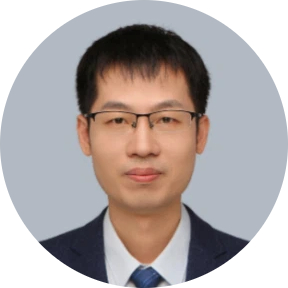Keynote Speakers
 Prof. Yonghui Li
(ARC Future Fellow, IEEE Fellow)
Prof. Yonghui Li
(ARC Future Fellow, IEEE Fellow)
University of Sydney, Australia
Yonghui Li is now a
Professor and Director of Wireless Engineering
Laboratory in School of Electrical and Computer
Engineering, University of Sydney. He is the
recipient of the Australian Research Council
(ARC)Queen Elizabeth II Fellowship in 2008, ARC
Future Fellowship in 2012 and ARC Industry
Laureate Fellowship in 2025. He is an IEEE
Fellow and Clarivate highly cited researcher.
His current research interests are in the area
of wireless communications. Professor Li was an
editor for IEEE transactions on communications,
IEEE transactions on vehicular technology and
guest editors for several special issues of IEEE
journals, such as IEEE JSAC, IEEE IoT Journals,
IEEE Communications Magazine. He received the
best paper awards from several conferences. He
has published one book, more than 300 papers in
premier IEEE journals and more than 200 papers
in premier IEEE conferences. His publications
have been cited more than 25000 times.
Speech Title:
Beyond 5G for Industrial IoT
Abstract: Connected smart objects, platforms and
environments have been identified as the next
big technology development, enabling significant
society changes and economic growth. The entire
physical world will be connected to the
Internet, referred to as Internet of Things
(IoT). The intelligent IoT network for automatic
interaction and processing between objects and
environments will become an inherent part of
areas such as electricity, transportation,
industrial control, utilities management,
healthcare, water resources management and
mining. Wireless networks are one of the key
enabling technologies of the IoT. They are
likely to be universally used for last mile
connectivity due to their flexibility,
scalability and cost effectiveness. The
attributes and traffic models of IoT networks
are essentially different from those of
conventional communication systems, which are
designed to transmit voice, data and multimedia.
IoT access networks face many unique challenges
that cannot be addressed by existing network
protocols; these include support for a truly
massive number of devices, the transmission of
huge volumes of data burst in large-scale
networks over limited bandwidth, and the ability
to accommodate diverse traffic patterns and
quality of service (QoS) requirements. Some IoT
applications have much stringent latency and
reliability requirements which cannot be
accommodated by existing wireless networks.
Addressing these challenges requires the
development of new wireless access technologies,
underlying network protocols, signal processing
techniques and security protocols. In this talk,
I will present the IoT network development,
architecture, key challenges, requirements,
potential solutions and recent research progress
in this area, particularly in 5G and beyond 5G.
 Prof. Jianbin Qiu
(IEEE Fellow)
Prof. Jianbin Qiu
(IEEE Fellow)
Harbin Institute of Technology, China
Jianbin
Qiu received the B.Eng. and Ph.D. degrees in
Mechanical and Electrical Engineering from the
University of Science and Technology of China,
Hefei, China, in 2004 and 2009, respectively. He
also received the Ph.D. degree in Mechatronics
Engineering from the City University of Hong
Kong, Kowloon, Hong Kong, in 2009.
He is currently a Full Professor at the School
of Astronautics, Harbin Institute of Technology,
Harbin, China. He was an Alexander von Humboldt
Research Fellow at the Institute for Automatic
Control and Complex Systems, University of
Duisburg-Essen, Duisburg, Germany. His current
research interests include intelligent and
hybrid control systems, signal processing, and
robotics.
Prof. Qiu is a Fellow of IEEE and serves as the
chair of the IEEE Industrial Electronics Society
Harbin Chapter, China. He is an Associate Editor
of IEEE Transactions on Fuzzy Systems, IEEE
Transactions on Cybernetics, and IEEE
Transactions on Industrial Informatics.
Speech Title:
Adaptive Boundary Control of Distributed
Parameter Systems
Abstract: Distributed parameter systems, which
are described by partial differential equations,
widely exist in aerospace engineering, robotics,
bioengineering, chemical engineering, and
electrical engineering. Over the past decades,
the control issues for distributed parameter
systems have attracted considerable attention.
In particular, the output-feedback adaptive
control of distributed parameter systems is very
challenging due to limited sensor measurements,
unknown spatially varying parameters, and
infinite-dimensional coupled dynamics. This talk
will introduce some recent results on
output-feedback adaptive boundary control for
several classes of distributed parameter
systems. The basic tools include observer
canonical form, swapping identifier, and
infinite-dimensional backstepping approach. In
addition, we will also discuss the neural
operator-based boundary control of
reaction-diffusion PDE-ODE cascade systems with
distributed interconnections.
 Prof.
Kaoru Ota (AAIA Fellow, Fellow of EAJ)
Prof.
Kaoru Ota (AAIA Fellow, Fellow of EAJ)
Tohoku University, Japan &
Muroran Institute
of Technology, Japan
Kaoru Ota received
her B.S. and Ph.D. degrees from the University
of Aizu, Japan, in 2006 and 2012, respectively,
and her M.S. degree from Oklahoma State
University, USA, in 2008. She is a Distinguished
Professor at the Graduate School of Information
Sciences, Tohoku University, Japan, and a
Professor at the Center for Computer Science
(CCS), Muroran Institute of Technology, Japan,
where she served as the founding director. She
has been recognized as a Highly Cited Researcher
by Clarivate Analytics in 2019, 2021, and 2022,
a Fellow of the Engineering Academy of Japan
(EAJ) in 2022, and a Fellow of the Asia-Pacific
Artificial Intelligence Association (AAIA) in
2025.
 Prof.
Mian-Xiong Dong (AAIA Fellow, Foreign Fellow of EAJ)
Prof.
Mian-Xiong Dong (AAIA Fellow, Foreign Fellow of EAJ)
Muroran Institute of Technology, Japan
Mianxiong Dong
received B.S., M.S. and Ph.D. in Computer
Science and Engineering from The University of
Aizu, Japan. He is the Vice President and
Professor of Muroran Institute of Technology,
Japan. He was a JSPS Research Fellow with School
of Computer Science and Engineering, The
University of Aizu, Japan and was a visiting
scholar with BBCR group at the University of
Waterloo, Canada supported by JSPS Excellent
Young Researcher Overseas Visit Program from
April 2010 to August 2011. Dr. Dong was selected
as a Foreigner Research Fellow (a total of 3
recipients all over Japan) by NEC C&C Foundation
in 2011. He is the recipient of The 12th IEEE
ComSoc Asia-Pacific Young Researcher Award 2017,
Funai Research Award 2018, NISTEP Researcher
2018 (one of only 11 people in Japan) in
recognition of significant contributions in
science and technology, The Young Scientists’
Award from MEXT in 2021, SUEMATSU-Yasuharu Award
from IEICE in 2021, IEEE TCSC Middle Career
Award in 2021. He is Clarivate Analytics 2019,
2021, 2022, 2023, 2025 Highly Cited Researcher
(Web of Science) and Foreign Fellow of EAJ.
